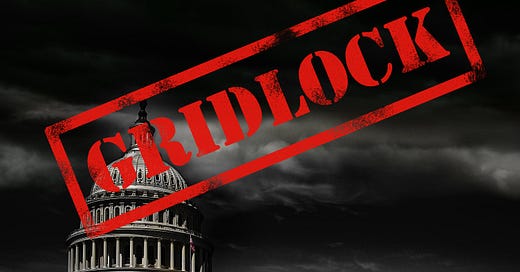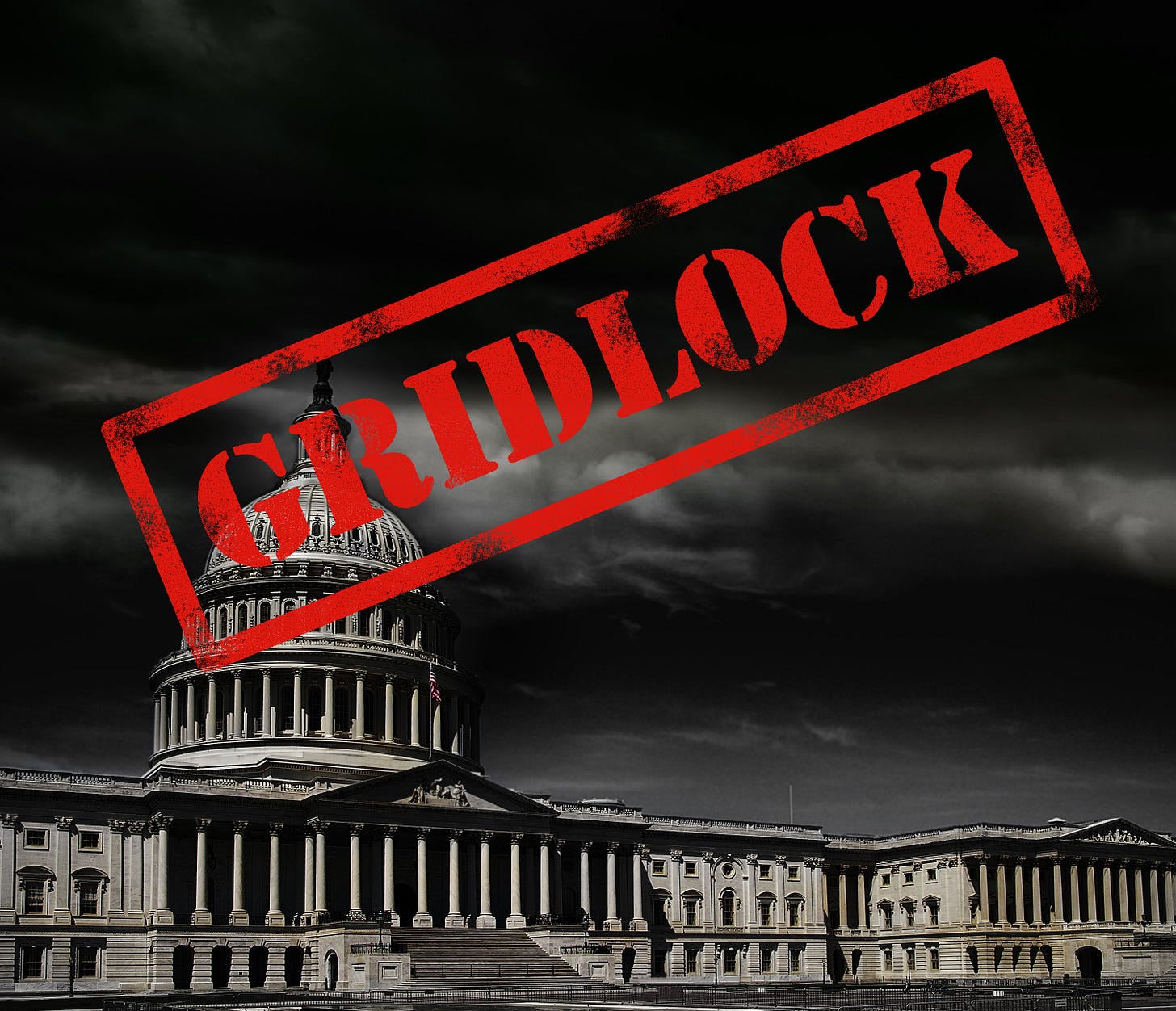Gridlock on Key Issues
Gridlock is well recognized from watching the federal government from any angle over the past 20 years. Margins of seats controlled in congress since 1995 have been narrower and changed party majority more frequently from election to election. Party control of the houses of Congress and the presidency has been divided for six of the past ten Congresses dating back to 2005. The simplest way to convey what gridlock looks like is to look at the congressional budget process.
Based on the 1974 Congressional Budget Act, Congress should pass 12 separate appropriations bills before the October 1st deadline. The last time that all of the appropriations bills were actually passed on time was fiscal year 1997; in fact, this deadline has only been met four times since 1977.1 Congress must resort to continuing resolutions (CRs), often used for anywhere between 60 days and 365 days in aggregate to fund the government. As deadlines loom, Congress will often resort to passing an omnibus bill, lumping all the separate appropriations bills into a single package that also gets packed with special goodies for legislators that wouldn’t be able to pass individually. Many omnibus spending bills have been passed in the last two decades, the most recent being $1.7 trillion for FY2023 passed and signed by President Biden on December 23, 2022.
The failure of Congress to pass budgets in timely ways following regular order for Congressional proceedings, as well as the failure to pass new budget laws that it can actually adhere to, is a clear signal that gridlock is hurting the functional business of Congress, and thus the nation.
Politician George Romney once said:
Dogmatic ideological parties tend to splinter the political and social fabric of a nation, lead to governmental crises and deadlocks, and stymie the compromises so often necessary to preserve freedom and achieve progress.2
While budgets don’t normally rank high as ideological battles, other concerns in America do. While a majority of Americans have expressed a growing desire for the federal government to pass legislation to try to curb gun violence in the United States, no major firearm legislation passed Congress between the 1980s/1990s and 2022, when the Bipartisan Safer Communities Act was passed. Immigration reform is another casualty of gridlock based on divisions of ideological parties. The last major immigration reform act occurred in 1986.
Ezra Klein noted that: “The problem is that we have a political system where the rules create irresolvable conflict, gridlock, and even global financial crises.”3 Senator Michael Bennet from Colorado put the concern as follows:
We are a democratic republic. If we can't make decisions because of structural issues in our political system, or because of a habit of mind that doesn't allow us to believe other people deserve to be on the playing field, we cannot govern ourselves. That is an existential threat to the next generation of Americans.4
The tool of the Senate filibuster to block legislation from coming to vote is another indicator of gridlock. According to congressional records, from 1917 to 1970, the Senate took forty-nine votes to break filibusters. That is an average of just under one each year. From 2013 to 2014, the Senate had to take 218. The next 4 congressional periods displayed an ominous trend in filibuster activity: 123, 168, 298 (a record), and 289.5
With gridlock in full swing, political effort gets channeled into sabotaging the other party. A Fox News opinion article by John Tillman, the CEO of the American Culture Project, following the November 2022 midterms, highlights how a new Republican majority in the House will focus on investigating the administration:
Election results weren’t even final last November and Republicans, who barely scraped together a House majority, made clear what they would prioritize in the next Congress. Investigations, investigations, and more investigations…. Curiously, investigations didn’t make it to the top of voters’ concerns heading into the midterms, nor were they even close. To be clear, Republicans should certainly be a check on progressive policies and actions that have run amok. Republicans also have every justification to probe the Hunter Biden laptop ordeal, the inexcusably botched withdrawal from Afghanistan, and the origins of COVID. However, the signal coming from Republican leadership is that investigations will be zealously pursued, taking precedence over the issues that are of actual concern to everyday Americans. To do so will be a mistake.6
Such emphasis on investigating the corruption and incompetence of the other party for hit points is deeply misguided. The simple fact that corruption seems to abound is no solace. With gridlock as the modus operandi, the circus of Washington proceeds to offer a sad show to keep the party faithful entertained. The American citizens lose precious time as real solutions to real problems are nowhere to be found.
American politics in gridlock is evidence of the more confrontational, zero-sum strategies that occur with polarized parties, rather than the more cooperative, tolerant approaches when political parties offer more overlap. Dysfunctional gridlock is a defect of our current two-party system structure.
Notes for new readers:
The Common Sense Papers are an offering by Common Sense 250, which proposes a method to realign the two-party system with the creation of a new political superstructure that circumvents the current dysfunctional duopoly. The goal is to heal political divisions and reboot the American political system for an effective federal government. If the movement can gain appeal, a call to crowdfund the project may occur in 2024. Subscribe for free with an email to follow along.
The tabs on the top of the Substack page can bring you to earlier essays that spell out key political issues. Common Sense Paper No. 1, No. 2, No. 4, and No. 5 can help anyone get up to speed on the project.
Common Sense 250 is exploring the launch of a podcast this fall for those who want to listen to the political strategy but don’t have time to read. Subscribe and watch for an email announcement.
Drew DeSilver, "Congress Has Long Struggled to Pass Spending Bills on Time," Pew Research Center, September 13, 2023, https://www.pewresearch.org/short-reads/2023/09/13/congress-has-long-struggled-to-pass-spending-bills-on-time/ (accessed October 26, 2023).
Ezra Klein, Why We're Polarized (New York: Avid Reader Press, 2020), 7.
Ibid., 224.
Ibid.
"Cloture Counts," United States Senate, https://www.senate.gov/legislative/cloture/clotureCounts.htm (accessed October 26, 2023).
John Tillman, "Earth to Republicans: Voters Don't Care About Your Investigations," Fox News, December 29, 2022, https://www.foxnews.com/opinion/earth-republicans-voters-dont-care-about-your-investigations (accessed October 26, 2023).






This is something I can’t stop thinking about, especially after reading Plato and his warnings against democracy. You’re making me want to read Ezra’s book!
I'm not sure "gridlock" is a bad thing. I don't want the government passing more crap. We need to repeal and shut down 80% of our government. My proposal is that to pass anything new should require at least a 66% majority vote (75% or 90% might actually be better).